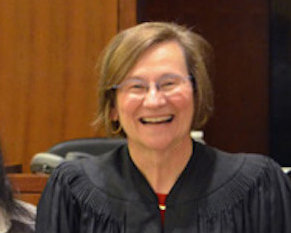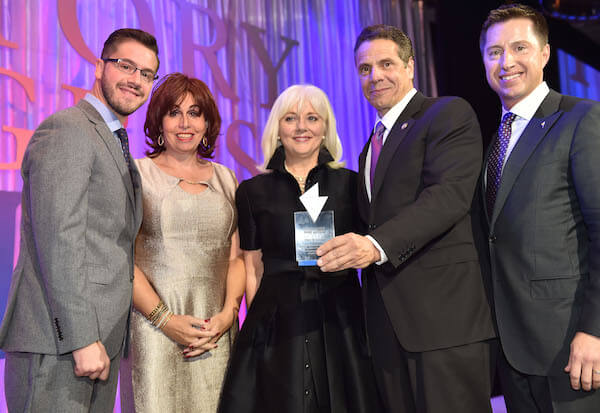Christina Strickland scored a victory in her claim to parental rights in a complex ruling from the Mississippi Supreme Court that shed no light on the underlying question of whether both mothers in a lesbian marriage are presumed to be entitled to parental rights regarding a child born to one of them. | LAMBDALEGAL.ORG
Ruling on a custody contest between a birth mother, Kimberly Jayroe Strickland, and her former same-sex spouse, Christina Strickland, on April 5, the Mississippi Supreme Court blocked Kimberly’s effort to contest Christina’s parental status.
Most states employ what is known as parental presumption in automatically recognizing the spouse of a woman who gives birth as a parent to the child, but the Mississippi court made no mention of that doctrine, instead relying on what is called “equitable estoppel” to prevent Kimberly from contesting Christina’s rights as a parent. As a result, the state’s high court refrained from resolving a critical question of same-sex family law.
Five written opinions were signed by different combinations of judges on the nine-member court, with none representing the views of a majority, but taken together they produce a holding that an anonymous sperm donor’s role in the child’s birth is irrelevant in determining the rights of the birth mother’s former spouse.
Mississippi Supreme Court rejects any consideration of anonymous sperm donor
The high court reversed a ruling by Judge John S. Grant, III, of the Rankin County Chancery Court, that the lack of a waiver of parental rights from that sperm donor prevents Christina from being recognized as the child’s legal parent.
The case is complicated because most of the story played out before marriage equality came to Mississippi in 2015 and also due to that state’s retrograde legislature neglecting to adopt needed statutes concerning parental rights in cases when a woman or a couple uses an anonymous donor’s sperm.
Christina Strickland and Kimberly Jayroe began their relationship in 1999 and in 2007 finalized the adoption of a child, E.J.. Because Mississippi did not allow joint adoptions by unmarried couples, only Kimberly was the legal adoptive parent of E.J.. In 2009, the couple traveled to Massachusetts to marry, even though their union was not recognized back home, and Kimberly took Christina’s last name.
The following year, the Stricklands decided to have a child using anonymously donated sperm from a Maryland sperm bank. Kimberly, whom they jointly decided would bear the child, signed the sperm bank’s form providing that she would “never seek to identify the donor” and that the donor would not be advised of her identity. In the Maryland clinic, Kimberly was recognized as a married woman and Christina was identified as her spouse in its paperwork. The two women signed the form acknowledging they were participating in the insemination process as a married couple and would both be parents of the resulting child.
According Justice David Ishee’s plurality opinion, “Christina testified that she was involved in and supportive through every step of the conception and pregnancy.” She also testified that the couple had planned to travel to Massachusetts for the baby’s delivery so that their marriage would be recognized and both be recorded as parents on the birth certificate. Six weeks before her due date, however, Kimberly gave birth to the child, Z.S., in an emergency cesarean section procedure in a Mississippi hospital. Since Mississippi did not recognize their marriage at that time, the birth certificate shows Kimberly as the only parent.
Over the next two years, the women functioned as a family unit, raising both E.J. and Z.S. as co-parents. Christina stayed home for the first year of Z.S.’s life, while Kimberly worked full time. Christina testified that both children call her “mom.” After the women separated in January 2013, Christina continued to visit both children and paid child support and medical and daycare expenses for Z.S.
Here the case took a strange twist: in August 2015, while still married to Christina — and at a time when, due to the US Supreme Court’s marriage equality ruling two months earlier, Mississippi was legally obligated to recognize the couple’s marriage — Kimberly married a second spouse, whose name and gender are not identified by the court. Kimberly is, however, identified by the court as Kimberly Jayroe Strickland Day.
That marriage prompted Christina to file a divorce petition in Harrison County Chancery Court on August 31, 2015. Two months later, Kimberly filed a motion for a declaratory judgment that her second marriage was valid and her first marriage “dissolved” in Rankin County Circuit Court. Christina answered with a counterclaim for divorce and legal and physical custody of both children, who were then living with Kimberly. She also sought to be named as Z.S.’s legal parent.
The two cases were consolidated in the Rankin County court. On May 17, 2016, Judge Grant issued an order declaring that Christina and Kimberly’s 2009 Massachusetts marriage was valid and recognized in Mississippi and therefore that Kimberly’s second marriage was void.
This led the women to negotiate an agreement that since Z.S. was born during their marriage, they would jointly pay all school expenses for the child, and that Kimberly would retain physical and legal custody of E.J., the adoptive child. They agreed to let the chancery court decide custody, visitation, and child support issues for Z.S., child support and visitation issues for E.J., and the question of Christina’s parental status toward Z.S.
Grant’s final judgment of divorce, in October 2016, ordered Christina to pay child support for both children and held that Z.S. was born during a valid marriage. But, he ruled, Z.S. was “a child born during the marriage, but not of the marriage,” so both women were not considered to be Z.S.’s parents. Grant viewed the anonymous sperm donor as “an absent father” whose legal parentage “precluded a determination that Christina was Z.S.’s legal parent.” The court held that she was, however, entitled to visitation with Z.S. under a doctrine called “in loco parentis,” which dictated that acting as a parent and bonding with the child entitled Christina to visitation even though she has no legal relation to Z.S.
Christina appealed, arguing that because Z.S. was born while Christina was married to Kimberly, Christina should be deemed the child’s legal parent, and that the anonymous sperm donor, who had no relationship to the child, could not possibly be considered its legal parent.
The Mississippi Supreme Court agreed with Christina that the sperm donor is out of the picture and should not be considered a parent. Justice Ishee’s opinion, for himself and three other justices, declared that Grant’s finding that the sperm donor was the child’s “natural father” was erroneous as a matter of law.
“[W]e never before have determined what parental rights, if any, anonymous sperm donors possess in the children conceived through the use of their sperm,” he wrote. “As such, this is an issue of first impression.”
That is a startling statement coming from a State Supreme Court in 2018, when donor insemination has been around for half a century and most states have adopted legislation on the subject. The only statute regarding donor insemination, Ishee noted, is a provision barring a man from seeking to deny paternity when a child is born to his wife via the procedure.
“How,” asked Ishee, “on the one hand, can the law contemplate that a donor is a legal parent who must have his rights terminated, while at the same time prohibiting the non-biological father of a child conceived through [artificial insemination] from disestablishing paternity? These two policies cannot co-exist.”
It would be “intrusive, time-consuming, and expensive,” he argued, for a judge to have to determine that an anonymous sperm donor, who never intended to be the parent of the child, had “abandoned” the child, thus making the child available for adoption by their mother’s spouse.
In her appeal, Christina raised alternative arguments in support of her claims to be Z.S.’s parent. First, she asked the court to determine a question not addressed in Mississippi law: “Whether children born to married parents who give birth to a child via [artificial reproductive technology] with sperm from an anonymous donor are entitled to the marital presumption that both spouses are their legal parents.”
Alternatively, she asked whether the US Supreme Court’s 2015 marriage equality ruling “requires Mississippi to apply laws relating to the marital presumption of parentage in a gender-neutral manner so as to apply equally to married same-sex couples.”
And she also asked whether the doctrine of “equitable estoppel” could be used to preclude a birth mother from trying to “disestablish her spouse’s parentage of the couple’s marital child based solely on the absence of a genetic relationship, when the child was born as a result of anonymous donor insemination, to which both spouses consented.”
Christina argued that Grant’s order violated her constitutionally protected liberty and equality interests by failing to recognize her parental relationship with Z.S.
Ishee’s opinion focused only on “equitable estoppel,” which he held precluded Kimberly from now disavowing the words and actions that Christina relied on in acting as a parent to their child. The judge rejected Kimberly’s argument that the decision to have a child through donor insemination was solely hers and that her marriage to Christina at the time was irrelevant. Ishee found that “the evidence in the record belies this assertion,” and cited chapter and verse, right down to the birth announcements the women sent out, which identified the women as “two chicks” who had “hatched” the child.
Since Kimberly represented to Christina all along that Christina would be a parent of Z.S., the doctrine of equitable estoppel blocks her from arguing to the contrary in the context of their divorce proceeding. Grant’s award of “in loco parentis” status to Christina was insufficient, in Ishee’s view, to protect her legitimate interests. If Kimberly were to marry somebody else and petition for her new spouse to adopt Z.S., Christina’s “in loco parentis” status would not entitle her to prevent that adoption. If the court recognizes her as a parent, she could.
Without ever mentioning the parental presumption, then, the plurality opinion reversed Judge Grant’s ruling that Christina acted “in loco parentis” but “was not an equal parent with parental rights to Z.S.” The court sent the case back to Rankin County Chancery Court to determine custody using the customary standard focused on the best interest of the child. A “guardian ad litem” was appointed to represent the child in the proceedings.
In an concurring opinion characterized as a concurrence “in part and in the result,” Chief Justice William Waller, Jr., joined in part by four other justices, wrote that even though the court “can use common-law principles to render a decision here, the Legislature should speak directly to the recognition of the legal status of children born during a marriage as a result of assisted reproductive technology.”
Other opinions in the case challenged either the use of the equitable estoppel doctrine or the holding on what rights an anonymous sperm donor may or may not have, so the direction this case gives to lower courts in Mississippi is a muddle. Still, in this case, Christina has scored a victory to the extent that enough members of the court agreed with the equitable estoppel approach to make that part of the holding of the court, tossing the case back to the trial court to decide anew whether it is in the best interest of Z.S. for Christina to have joint or primary custody of the child as a parent.
Critically, however, the state’s high court, for now, has made no finding on the underlying question of whether a child born to a married lesbian couple is automatically deemed to be the legal offspring of both women. Under other circumstances, then, a Mississippi co-parent may find herself having to litigate this issue to protect her rights regarding a child she has been raising with her same-sex spouse.
Christina is represented by Mississippi attorney Dianne Herman Ellis and Lambda Legal staff attorney Elizabeth Lynn Littrell. Kimberly is represented by Prentiss M. Grant.




































